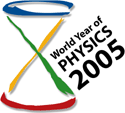





|
Congress of belarusian physicists World Conference on Physics and Sustainable Development UN Declares 2005 International Year of Physics
Conditions for EW TF supports of the participations at international meetings
|
 UN Declares 2005 International Year of PhysicsFollowing months of intensive lobbying effort, notably by M. Ducloy and C. Rossel, the United Nations General Assembly has adopted the resolution A/58/L.62 declariong 2005 as the International Year of Physics. The EPS, IUPAP, and other physical societies around the world have already declared 2005 as the World year of Physics. United Nations sponsorship will be another step ensuring the success of this initiative. Below is the text of UN press release GA/10243: By the terms of another resolution adopted today, contained in document A/58/L.62, the Assembly declared the year 2005 the International Year of Physics, and invited the United Nations Educational, Scientific and Cultural Organization (UNESCO) to organize activities celebrating the Year, collaborating with physics societies and groups throughout the world, including in the developing countries. Introducing the text, Lebohang K. Moleko (Lesotho) said that, in 1905, Albert Einstein had published several scientific articles that had profoundly influenced understanding of the universe. He had introduced utterly revolutionary ideas on fundamental questions, including the existence of atoms, the nature of light and the concepts of space, energy and matter. The aim of the International Year went beyond the mere celebration of one of the greatest minds in physics in the twentieth century. The Year would provide an opportunity for the largest possible audiences to acknowledge the progress and importance of the great field of science. The Year should also be the occasion to begin prospective debates on the great need for scientific research in the twenty-first century, he said. The debates would also have to relate to social issues, which accompanied the practice of science, in general, and of physics, in particular. The ethical responsibilities for physicists were enormous. The Year would allow all practitioners, especially women, to more actively participate in its advancement. Countries around the world were preparing special events to celebrate the Year under the sponsorship of UNESCO. The launching of the Year would take place at UNESCO headquarters in Paris from 13 to 15 January 2005. For more information, please see http://www.un.org/Depts/dhl/resguide/r58.htm |